Alabama Still Waiting on IVF Study: Months after the Alabama Supreme Court’s pivotal decision regarding the legal status of frozen embryos, the delay in establishing an IVF study commission has created a void of guidance in the domain of assisted reproductive technology. As stakeholders anxiously await the formation of this commission to navigate the complex intersection of law and fertility treatments, the uncertainty surrounding the future landscape of IVF services in Alabama looms large.
With significant legal and ethical implications hanging in the balance, the spotlight remains on when clarity will be shed on the path forward for individuals seeking fertility treatments in the state.
Key Highlights
- Legislative action prompted to shield IVF clinics post court ruling.
- Rep. Terri Collins acknowledges delay in commission formation.
- IVF programs face closure due to legal risks.
- Details on study commission formation remain scarce.
- Stakeholders urge urgency in establishing a solution.
Legislative Response and Delay in Forming Commission
The establishment of the IVF Study Commission in Alabama has faced delays following the legislative response to protect in vitro fertilization services and the subsequent decision to study the issue further.
After the Alabama Supreme Court’s ruling on Feb. 16, which classified frozen embryos as children, legislators swiftly acted to shield IVF clinics from potential legal repercussions. However, this prompt legislative action has been met with criticism, with opponents labeling it a thorough solution that necessitates further examination.
Rep. Terri Collins, R-Decatur, who spearheaded the bill in the House, has acknowledged the delay in establishing the commission. She noted that there is currently no update but mentioned plans to visit IVF centers in the upcoming weeks to gather additional information. The aim is to ensure a detailed understanding of the complexities surrounding IVF services in Alabama before the commission is officially formed.
As stakeholders await the commission’s establishment, the need for extensive research and deliberation on this critical issue remains paramount.
Uncertainty and Potential Impact on IVF Programs
Amid the evolving landscape of IVF regulations in Alabama, the uncertainty surrounding the potential impact on IVF programs looms large, raising concerns within the fertility treatment community.
The court’s ruling, which led to the closure of several IVF programs due to legal risks following the unauthorized destruction of frozen embryos at a Mobile clinic in 2020, has created a ripple effect. The decision prompted the Mobile health care system to announce the cessation of IVF services by year-end, attributing the move to lawsuits over fertility treatments.
Despite Rep. Terri Collins’ assurances of ongoing discussions, details about the formation and composition of the study commission to address these issues remain scarce. Charles Murry, the spokesperson for House Speaker Nathaniel Ledbetter, hinted at an impending announcement from their office, indicating some progress in response to the challenges faced by IVF programs in Alabama.
The uncertainty surrounding the regulatory environment has left IVF providers and patients in a state of limbo, awaiting clarity on the future of fertility treatments in the state.

ALSO READ: EPA Shuts Down Alabama Power Coal Ash Plan What’s Next?
Stakeholder Perspectives and Future Considerations
Examining the diverse viewpoints of stakeholders in the IVF industry sheds light on important considerations for the future of fertility treatment in Alabama.
Betsy Campbell, representing RESOLVE: The National Infertility Association, emphasized the critical need for ensuring continued access to IVF in the state. While acknowledging communication with Rep. Collins, Campbell stressed the urgency of establishing a thorough solution to protect IVF rights. She underscored the far-reaching implications of the Supreme Court ruling on patient care and provider practices, urging prompt and thoughtful resolution of the issue.
In response, House Minority Leader Anthony Daniels proposed an amendment to address the matter; however, faced challenges in its progression. Campbell’s advocacy for the timely and detailed resolution of IVF-related uncertainties highlights the pressing need to address regulatory gaps and safeguard access to fertility treatments in Alabama.
As the debate continues, stakeholders like Campbell play a pivotal role in shaping the future landscape of IVF practices in the state.
News in Brief
The delay in forming the IVF study commission in Alabama, following the Supreme Court ruling on frozen embryos, has created uncertainty and halted some fertility services.
Stakeholders are anxiously anticipating clarity on the legal implications and protection of IVF clinics.
The legislative response to this issue is vital for the future of fertility treatments in the state.

